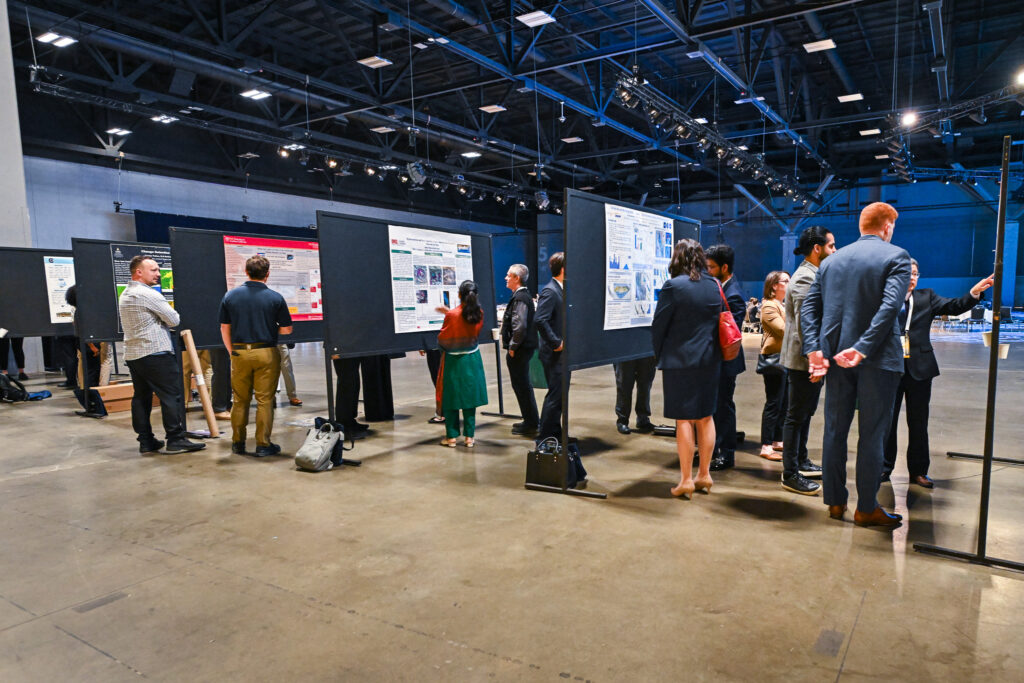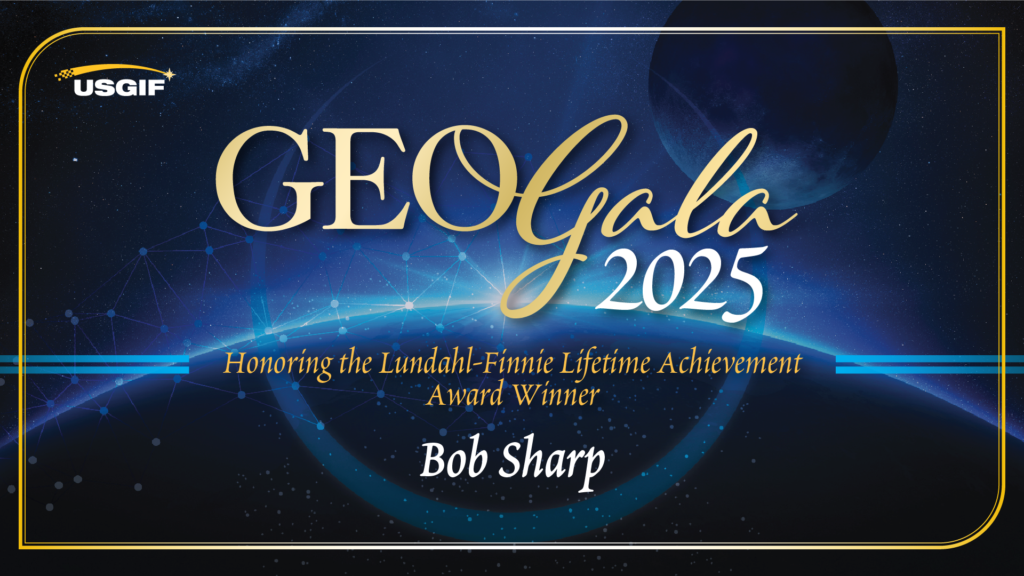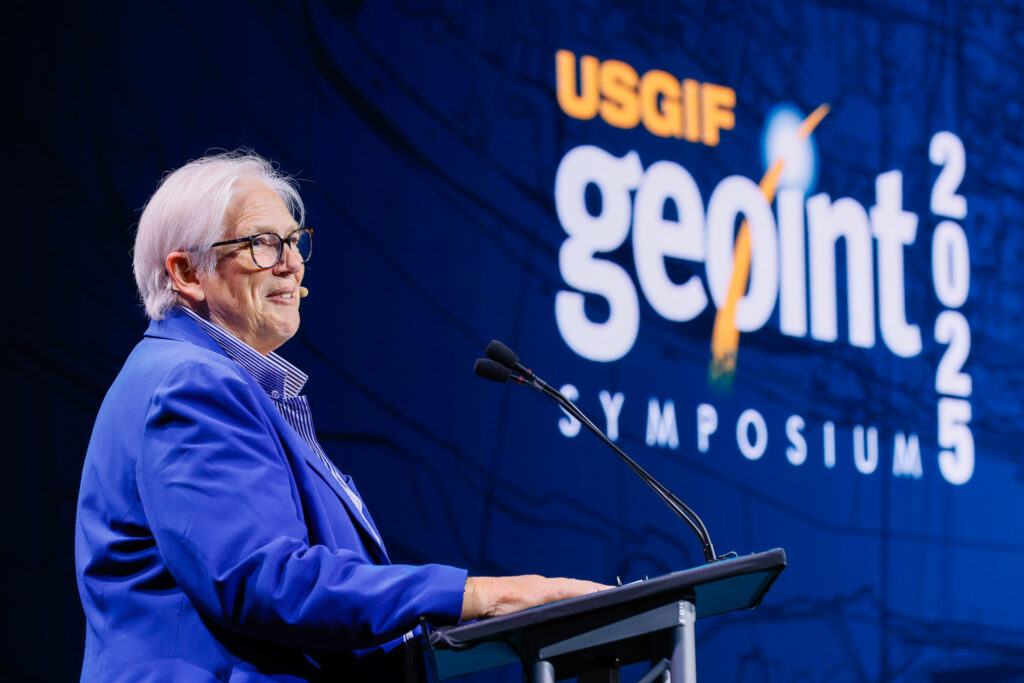Letitia A. Long, 2022 Lundahl-Finnie Lifetime Achievement Award
Letitia A. Long spoke with USGIF CEO Ronda Schrenk about her remarkable career, accomplishments, and advice for those entering the intelligence field.


Letitia A. Long is the 2022 Lundahl-Finne award recipient. The Arthur C. Lundahl – Thomas C. Finnie Lifetime Achievement Award is presented, upon nomination and vote by the USGIF Board of Directors, to an influential member of the geospatial intelligence community who has dedicated much of his or her life’s work to the tradecraft.
This distinguished award recognizes contributions made by both Arthur C. Lundahl and Thomas C. Finnie, and celebrates their accomplishments—in imagery analysis and mapping, respectively—and their legacy within the GEOINT community.
Ronda Schrenk: What led you to a career in intelligence, Letitia A. Long?
Tish Long: My parents were both in the Intelligence Community, as were three of my brothers. They all worked at the National Security Agency. While studying electrical engineering at Virginia Tech, I also co-opped, which means I alternated working full-time and attending school full-time to help pay for my college education. I co-opped with the Navy at a research lab in Annapolis, and when I graduated, I went to work at the headquarters of that lab, the David Taylor Research Center. My first job was building acoustic intelligence collection systems for submarines. I spent about six years doing that, designing and installing the systems on submarines. Subsequently, I went to work at Naval Intelligence, where I managed the programs I had been working on at David Taylor. So that was my entree into the Intelligence Community.
Ronda: Wow. That’s quite an amazing beginning to your journey. Can you tell us about some of the most influential leaders on your path, Letitia A. Long?
Tish: I’ll start with my parents. As I said, they both worked at the Army Security Agency, which then became NSA. My parents instilled in me a sense of public service, of being a part of something larger than yourself. I was really fortunate in school, and I had a couple of amazing teachers in junior high and high school who saw how much I loved math and encouraged me. I also had a guidance counselor who encouraged me to go into engineering. I didn’t even know what it was at the time. She set up meetings for me with engineers in the local community. I mean, it’s pretty extraordinary when you think about it.
And then, fast forward to my working career. I had one amazing opportunity after another with some great supervisors who became mentors, but the two people who both influenced me most, and have remained mentors of mine throughout the latter part of my career, are Joan Dempsey and Jim Clapper. Joan sat on my selection committee when I was selected to senior executive at Naval Intelligence. I didn’t know Joan at the time; I met her several months later. We formed a good business relationship initially that became a lifelong friendship. And she was responsible for setting up an interview for me with Jim Clapper, then Lieutenant General Jim Clapper, when he was director of DIA. I left Naval Intelligence on a rotational assignment to the Defense Intelligence Agency. That was in 1994. Jim and I, and Joan and I, worked together many times in different positions over the next 20-plus years. Joan and Jim have been the most influential and remain so today.
Ronda: Among your many career accomplishments, which stands out most, Letitia A. Long?
Tish: When I was selected to be the Director of NGA. I worked hard to get to the point of being considered and competitive for the director position. People often emphasize the fact that I was the first woman to lead one of the big six intelligence agencies. Just as important is the fact that I was the first civilian to lead one of the combat support agencies—I think that’s unique and still stands out to me today.
Ronda: Is there a significant milestone or event in your mind that led to where you are now, Letitia A. Long?
Tish: Let’s start with growing up. I was one of eight children, number six of eight, with five brothers. And I learned at a very early age how essential teamwork is. You have to work together. I learned how important it was to speak up. If you wanted something, you needed to have your voice heard, you needed to take your seat at the table. Growing up in that environment really prepared me to be a female engineer at Virginia Tech in the late ’70s and early ’80s. There weren’t many women at the David Taylor Research Center solely focused on submarines, and there were no women on submarines at that time. My childhood prepared me for that. And the other thing that has helped get me where I am today is my strong network. I could fill a ballroom with people who have mentored me. There have been so many. And likewise, those that I mentor, I think I learned as much from them.
Ronda: How has the Intelligence Community, specifically with an eye toward GEOINT, changed throughout your career, Letitia A. Long?
Tish: It has changed tremendously. When I started working in the Intelligence Community in 1982, it wasn’t a community, it was a community in name only. It was a bunch of stove-piped organizations, and only a couple worked together, sometimes. That is probably the most significant change from when I started until today. We really are better when we are integrated, when we are working together. A great example is the bin Laden operation, which occurred when I was director of NGA. Our agency, along with CIA and NSA, worked so closely together on the search part of the problem set—it was almost as if we’d formed an entity unto itself.
From a community perspective, it’s that strong integration. From a GEOINT perspective, it’s the same thing. If you think about how GEOINT has changed, when I started in this business, there wasn’t anything called GEOINT. It was mapping and geodesy over here and imagery intelligence over there. The integration of those three disciplines is what brings us geospatial intelligence today. When you put that together, it’s much more powerful than just the sum of the parts. And then, with GEOINT, think about how much has changed with commercial industry. Now you have the whole commercial side of things integrated in, and open source is used much more than it ever used to be. And then add the technological aspects of artificial intelligence and machine learning. When you think about automated tipping and queuing between our sensors, and the layering in of all the different intelligence disciplines, GEOINT looks a lot different today than it did when I started.
Ronda: Professionally, is there an achievement or achievements that you’re most proud of, Letitia A. Long?
Tish: When I think about things I’m most proud of, it really has to do with other people. I have been so fortunate in my career, the opportunities that I had one after another. When I reflect on them, it’s pretty extraordinary—all of the different jobs I had. And when I say opportunities, I mean the ability to work on the stand up of the National Imagery and Mapping Agency, to be a part of that task force on the creation of NIMA—who gets to do a startup in the government? I’ve done half a dozen. I was part of the standup of the Deputy Director of Central Intelligence for Community Management, the forerunner to the ODNI.
But when I think of significant achievements, I think of young women and men I’ve mentored, and now they’re running organizations, commanding task forces or brigades or battalions. They’re off doing amazing things. When I think about some of the young officers, both military and civilian, that I’ve had the honor of promoting and seeing them shine, seeing them lead organizations—if I had a little bit to do to inspire them to continue in the Intelligence Community, that’s my biggest achievement.
Ronda: Looking back, is there anything that you would change? Or maybe do a little different, Letitia A. Long?
Tish: I’m not a big fan of do-overs. As I said, I’ve had some extraordinary opportunities. I’m not sure there’s anything I would change. Maybe something I’d do differently is I’d have a little more balance in my life. I’m very driven. As part of mentoring, I often get asked the question: How did you manage your work/life balance? And my answer is: poorly. I do subscribe to work hard, play hard. And I absolutely have done that throughout my life. But when I look at this next generation and see how balanced they are, how well rounded they are, it took me a lot longer to recognize you really needed that balance.
Ronda: Let’s look in the other direction going forward. Other than work/life balance, what’s still on your professional bucket list, Letitia A. Long?
Tish: I have done much more than I ever dreamed possible. When I started out in the community, there were no women agency directors and no women in the most senior positions. So, on the one hand, I didn’t aspire to them because I didn’t think it was possible. While it’s out of my control, I’d like to put it on my professional bucket list: facilitating all 18 organizations in the Intelligence Community to be led by women at the same time. We never commented when men ran all the entities. Let’s have it be natural for them to all be run by women. What do you think, Ronda?
Ronda: I’m a big fan. That is something that I see coming. What advice might you have for people considering a career in the national security sector, Letitia A. Long?
Tish: First of all, find what you can be passionate about. If you are passionate about your job, then it’s not a job. It’s a labor of love. Find what really sparks you and then become an expert, build a foundation you can use as your launching pad. And then branch out—I moved around the Intelligence Community a lot. I worked at CIA, DIA, Naval Intelligence twice, but before you start doing that, you’ve got to build a foundation. It’s important that you move around to continue to develop. If you’re an analyst, take a stint on the collection side of the house. If you’re in government, go to industry, or vice versa. Or if you’re in government, take a joint duty assignment with another agency, broaden your horizons, build your network, take on mentors (we all need mentors), take on mentees. I am most fulfilled when helping others—I believe we all are. Never stop learning. Always go for that next challenge. Part of continual growth is having the courage to take risks, measured risk, calculated risk, but risk nevertheless. And sometimes you have to put yourself forward, which is not always easy for those of us in the Intelligence Community who are about service, to sometimes raise our hand and say, why not me for this opportunity? Sometimes you have to do a little self-promotion, which, especially as a woman, can be uncomfortable, but you can also tap your network to help.
Ronda: I love that. I couldn’t agree with you more. And yes, it’s scary to take risk and rewarding at the same time. I want to thank you for all that you’ve done for the Intelligence Community and all you continue to do for us and the next generation of leaders. You have been an amazing trailblazer, and you continue to be one. Thank you, Tish.
Related Articles
USGIF Celebrates 2025 GEOINT Symposium Student Poster Winners
USGIF proudly recognizes the outstanding achievements of the top three winners of the 2025 Student Poster Competition, selected from an exceptional field of uni…
USGIF Honors Vice Admiral Robert Sharp, USN (Ret.), with 2025 Lundahl-Finnie Lifetime Achievement Award
The United States Geospatial Intelligence Foundation (USGIF) is proud to announce Vice Admiral Robert “Bob” Sharp, USN (Ret.), as the recipient of the 2025 Arth…
GEOINT Symposium 2025 Day Three Recap
GEOINT’s Next Frontier: Space Collaboration and Strategic Alignment The final general session day of the 2025 GEOINT Symposium highlighted the challenges and o…




